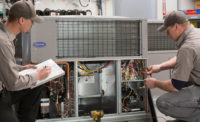Technicans are in a unique position in the HVAC contracting world because they often act as both a serviceman and salesperson. Some companies even push for their service techs to sell, offering cash bonuses or other incentives. And the numbers prove sales are up — according to the Air-Conditioning, Heating, and Refrigeration Institute (AHRI) October 2017 U.S. Heating and Cooling Equipment Shipment data, year-to-date combined shipments of central air conditioners and air-source heat pumps increased 6.9 percent, to 455,303, up from 425,882 units shipped in October 2016; year-to-date shipments of central air conditioners increased 5.9 percent, to 4,621,922 units, up from 4,365,690 units shipped during the same period in 2016; and the year-to-date total for heat pump shipments increased 7.9 percent, to 2,278,443 units, up from 2,110,657 units shipped during the same period in 2016.
This leads to the question: When should a service tech repair versus recommending system replacement? Many HVAC industry professionals feel pushing replacement does a disservice to the customer.
“The one thing servicing contractors have that makes them specifically unique to potential customers is the ability to troubleshoot and repair,” said Frank Besednjak, president and CEO, The Training Source Inc. “Unfortunately, what’s happening is the whole industry of servicing contractors is being pushed to do nothing but replace. Well, when we get to that point, we end up having a bunch of salesmen instead of servicemen. Now, we don’t need anybody with any skills, and we’re basically going to put ourselves out of the market because there is no specific skill. Any pharmaceutical rep salesman can come in and start selling heating and air conditioning units and water heaters if you teach them enough stuff. They don’t have to troubleshoot anything. And that’s the problem with the industry. I can order an HVAC system off the internet, I can hire anybody with the skill to come in and install it. Now where do we go? The industry loses its unique contribution.”
Besednjak said he sees this happening all over the place.
“I get emails from people telling me replacement is the majority of their business — and that is because we’re making it that way,” he noted. “The industry experts are telling contractors they need to sell products and ignore all the people they can’t sell to. There are huge groups of people who are considered the ninjas and gurus of the industry who are teaching this — and they’re showing that it’s working. Yes, you’re going to make money, but down the road, it’s going to fall apart, and then you’ll have no loyal customers. The next thing you know, you’re being investigated by the attorney general or Better Business Bureau.
“Basically what’s happening is they’re eliminating the service technician and replacing them with the salesperson, and now we have a whole customer base of people who are mad,” Besednjak continued. “I’ve heard of companies recommending replacing an entire system because the condenser was dirty. They could have cleaned it, but they recommended replacement, and the people did it because they didn’t know any better. They hired the company to educate them, but the guy who came in was a salesperson. And that’s happening a lot, and it’s really sad. Just by looking at reviews of companies, I can tell the ones who only push sales compared to the companies who go out and service. The other kind are a one-shot deal — they sold it, and now they’re done — they’re only looking at the short term. It’s sad, but it’s a trend in the industry. I see more and more of this happening.”
CUSTOMERS’ CHOICE
The key, according to Besednjak, is to understand how customers think.
“Could you imagine yourself going into a store to buy a jacket, and there’s just one — one color, that’s it?” he asked. “Most likely you wouldn’t want to buy it. You will probably find another store with more than one to pick from. What’s happening now with contractors is a service guy or salesman goes in and says it’s going to be $3,400. And the customer looks at it and thinks there’s no other choice. So, they have a tendency to call someone else.”
It all comes down to money when it should really be about loyalty, long-term benefits, and those other things customers are missing the boat on, Besednjak added.
“Contractors ought to develop menu pricing — it allows you to go in, and say, ‘I can replace the capacitor for $250; however, I have these other options.’ You can show them the $250, but it goes all the way up to replacing the whole system if they want. It’s their choice. They can look at this menu of five or six different things, and studies have shown that in any buying situation, maybe 18 percent pick the lowest price of anything. Everybody else picks something in the middle because they don’t want the lowest price.”
According to Rodney Koop, founder and CEO of The New Flat Rate, many contractors push replacement and justify it to themselves that it’s the best option for the customer.
“When I got into this business, the 12-SEER air conditioner had just become standard,” Koop said. “Contractors would tell their customers, ‘Well, you have a 10 SEER that is 12 years old, you can get 20 percent more efficiency by going to the new 12 SEER, so you would really save money over the long run by replacing instead of repairing.’ That’s how they justified it. The same thing happens today. If a guy has a 12- to 14-year-old air conditioner, the tech says, ‘You really need to replace this, the new ones are so much better, they’ve got the better warranties, and it’s just not worth putting money into this.’ And they tell themselves they believe that.
“If it’s such a great idea, why do they pay service technicians not to repair?” he continued. “They pay them by giving them an incentive to turn it over to a salesman. Let’s say I’m a service tech, and you have a 12-year-old air conditioner. My boss has told me if it’s 12 years old, it needs to be replaced. I see your blower needs to be pulled and cleaned, which is kind of a pain. But my company will give me $125 if I turn this over to a sales consultant. I see a job I don’t want to do, and it fits the age criteria. If I can convince the customer to let the salesman come out, I get $125, and I don’t have to do the work. That’s kind of a strange situation.”
Koop said some contractors push replacement because they believe they cannot make a profit off their service departments.
“But, educated business recognizes that the money is in service,” he said. “At Ford Motor Co., the No. 1 goal for the dealership is to pay the entire overhead of the business just out of the service department. If they have to sell a new car to you at invoice or at absolute break even to make you a Ford customer so that, eventually, you start bringing that thing in for service and maintenance, they will do that. That’s why they have those crazy sales. They will run the sales department at break even or a loss. They recognize the profit — the big bucks — are in the service department.”
Koop noted that contractors are completely opposite, running the service department at break even or a loss to get the sale.
“Our industry has been taught by wholesalers to run a wholesale business,” he said. “Wholesale requires professional salespeople selling by volume. Now, let’s look at the home service contractor. Should you hire service techs with great communication skills, or should you hire service techs with great technical ability, great craftsmanship, and the ability to diagnose and repair? You know which one is sought after. Our industry believes the techs need selling and communications skills. Why? Because they are running a wholesale company. They require the tech to sell and upsell. Because the service techs cannot and will not sell and upsell in a home. It forces the service department to operate at break even or a loss, and they become desperate for the replacement sale.”
According to Koop, the last five years of an air conditioner or furnace produce tickets that are, on average, three to five times higher. So by pushing customers to sell when their systems are 10 years old, a contractor loses out on several years of really high profit.
“The solution is to go to a retail business model,” Koop said. “You give the customers choices based on nothing more than what they wanted in the first place. If they called you to repair their air conditioner, then you should give them choices on repairing it. You should never mention replacing until they bring it up. If you give them choices on repairing, and the choices are done correctly, and only a menu can do it correctly, then about 70 percent of customers will always buy more, putting you in high profit dollars in your service department, similar to IBM, Ford, and big-box retail stores.”
UNETHICAL PRACTICES
Butch Welsch, owner of Welsch Heating & Cooling Co., St. Louis, said he knows there are contractors out there who push replacement sales over service repairs.
“We know this to be true because we have been called in after another contractor was there and condemned the unit, saying it was non-repairable, all the while attempting to sell the customer on a replacement unit,” he said. “In many of those instances we have found that a very simple and relatively inexpensive repair could be made without the need to replace the unit. We feel that this often occurs because the service technicians are compensated in a manner which puts more money in their pocket when a replacement is made.”
Welsch said he finds the process disturbing and unethical.
“We have always taken the approach that we want to do what is the best for the customer,” he said. “While that may just be a minor repair at the time, we believe if we are honest, customers will appreciate our honesty, and eventually, when the time is right, we will be called for the replacement. Most importantly I can go to sleep each night knowing that we haven’t gone out of our way to take advantage of a consumer who has no knowledge of our industry.”
Welsch Heating & Cooling’s mix of business is 42 percent new construction, 21 percent service, and 37 percent replacement.
“We are delighted with this mix,” Welsch said. “A very knowledgeable service manager we had several years ago taught me an important lesson. At that time, we were doing mostly new construction, and I didn’t know or understand much about the service business. The service manager’s advice to me was: ‘No customer ever wants to buy service on a furnace or air conditioner. As a result, anything they have to pay is more than they desire to pay. So, if you only charge $50 and do a bad job, they are still going to be unhappy. Therefore, you are better off charging the amount you have to in order to be profitable, and make sure you do a great job.’ They are not thrilled in either case, but in the long run, they will be happier with a correct repair for $150 than an incorrect repair for $50.
“This whole issue is extremely important to us,” he continued. “The foundation of our 122-year-old business is built on integrity. We define integrity as doing the right thing for the customer. Many years ago we had to terminate a service technician because he was unjustifiably condemning furnaces. I would say that many have worked for a number of years to improve the image of our business. The handling of the repair versus replace question is extremely important for us to maintain the level of professionalism we have attained.”
MAKING RECOMMENDATIONS
Wade Hamstra, vice president, Hamstra Heating & Cooling Inc., Tucson, Arizona, also believes there are contractors who push replacement over repair, saying some do it for good reason.
“Unfortunately, others do it for selfish reasons,” he said. “We’ve heard the horror stories about HVAC contractors who employ ‘selling techs’ who are merely sales people in disguise. They lack technical training and are sent into homes with the primary objective to condemn the HVAC system and sell a replacement. We’ve heard the stories about companies that ‘team-up’ a tech and a sales person for the purpose of driving replacement sales. The tech goes into the home for a service call while the sales person waits down the street for the call to swoop in and save the day with a timely quote for a new system because the tech found some unrepairable issue.
“On the other side, there are contractors who promote replacement for the long-term benefit of the client,” Hamstra continued. “They train their techs how and when to make these recommendations to clients. Our policy is that system replacement recommendations be made on any system older than 15 years. With the abuse air conditioning systems go through out here in Arizona, system life expectancy is much shorter than other regions of the country. So, our approach is to always offer and educate. If we do not provide a client with all of their options and do not educate them regarding the potential outcomes of their repair versus replace decision, we have failed in our duty.”
Hamstra said one of his most dreaded complaint calls is when a customer invests several thousand dollars into a compressor repair for an aged system, and throughout all of his company’s interactions with that customer, nobody ever brought up replacement as an option. Then, a few months later, another major component fails, and they are again faced with a lofty repair quote.
“In that situation, I have no defensible response because our staff made the decision to withhold information and options from the client,” he said. “We essentially made the choice to go down the repair route for them, and that is unacceptable within our organization. In many situations, this is equally as bad as a contractor pushing a client to replace over repair.”
That being said, Hamstra absolutely believes that HVAC contractors can make money in service.
“I disagree 100 percent with contractors who don’t believe they can make money on service repairs any longer,” he said. “Sure, competition has gotten tougher, and with the internet, anybody can go online and research the costs of common parts. But that just means we must deliver greater value as service providers to justify our repair rates.”
DIAGNOSING THE REAL ISSUE
Steve Moon, owner of Moon Air Inc., Elkton, Maryland, said contractors push replacement sales because there are higher profits in replacement.
“The real issue is the contractor doing the recommending,” he said. “Is he acting with honor and integrity and thinking of the client’s best interest at heart? Some will lie to the client just to get the replacement. It gives our whole industry a black eye.”
Moon Air is an 80/20 company in that it does 80 percent replacement and 20 percent service. However, the company takes steps to ensure its customers are not taken advantage of.
“We do a lot of follow up with our clients and inspect equipment that has been replaced,” Moon said. “We use the Inspector Camera system. It records the call and what is said to the client. If a guy is doing the wrong thing, we find out quickly and get him off the team. This is important because one bad apple can ruin the reputation of a 20- or 30-year-old company. Any honorable company works hard to keep its standards very high to avoid these rogue techs. Client security is the most important thing we can look out for.”
According to Moon, service is a very hard place to make a living.
“The overhead of four service calls [which should be one day’s work] exceeds the overhead of a one-day installation by about 80 percent,” he said. “You have to be good with your numbers, and make sure you are priced right to make money in service. Some contractors get hooked on the replacement sale like cocaine. They will lie, steel, and cheat to get them. It hurts our industry and makes it very hard for the rest of us. Service is a very necessary part of our business. It can be profitable if you do it right.”
Publication date: 12/25/2017
Want more HVAC industry news and information? Join The NEWS on Facebook, Twitter, and LinkedIn today!








